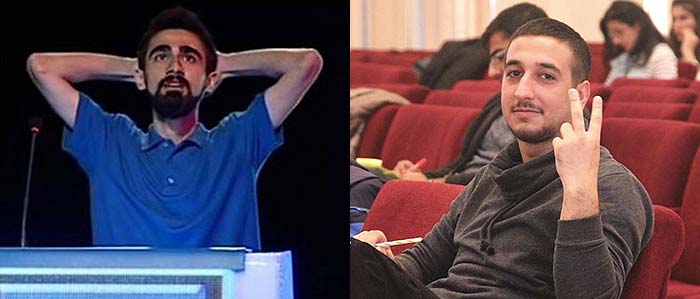06 Dec 16 | Azerbaijan, Azerbaijan Statements, Campaigns, Campaigns -- Featured, Statements
[vc_row][vc_column][vc_column_text]

Qiyas Ibrahimov and Bayram Mammadov were arrested after spray painting graffiti on a monument to Heydar Aliyev in Baku.
The government of Azerbaijan is carrying out a multi-pronged attack on freedom of expression, including introducing harsh penalties for critical speech online, imprisoning young activists for nothing more than graffiti, blocking access to websites of independent media, and harassing and violating the rights of journalists and activists. The undersigned organisations call upon the Azerbaijani authorities to reverse this alarming trend and respect basic human rights and freedoms, as well as for international partners to ensure Azerbaijan honours its treaty commitments as a state party to the European Convention on Human Rights and the International Covenant on Civil and Political Rights.
Earlier this year, two young activists from the N!DA youth movement, Bayram Mammadov and Qiyas Ibrahimov, were arrested after spraypainting graffiti on a monument to Heydar Aliyev in Baku. They were arrested on spurious drug charges and allegedly tortured repeatedly in police custody. Ibrahimov was recently sentenced to ten years imprisonment in what the head of the country’s press freedom watchdog Institute for Reporters’ Freedom and Safety Emin Huseynov rightfully called, “a prime example of travesty of justice in Azerbaijan.”. Mammadov, whose trial is underway, will most likely face the same fate as last Friday the prosecution requested a 10 years and 6 months imprisonment for him.
In Sumqayit, the journalist Ikram Rahimov and a private citizen Rahman Novruzov were sentenced to a year in prison for libel after reporting on bribery and tax evasion by local authorities. In striking similarity to the N!DA case, Rahimov alleges he was tortured for three days by local police after refusing to apologise to the local authorities whose criminal activity he had uncovered. Meanwhile in Jalilabad region, the journalist Afgan Sadigov is set to begin trial for “infliction of a minor harm to heath” after an altercation with a local woman with a history of getting into physical confrontations with citizens who anger regional authorities through dissent or critical reporting. Sadigov faces up to five years in prison.
“The arbitrary persecution of Azerbaijani journalists is disturbing, and it is vital that the state protect its citizens’ rights to expression and freedom from torture and arbitrary detention,” said Robert Hårdh, Director of Civil Rights Defenders, “these cases represent a serious deterioration in the rule of law in the country, and it is vital that steps be taken to remedy the situation.”
Independent journalists who stay out of jail are also having a hard time reaching their audience, as the websites of the local affiliates of RFE/RL and Voice of America have reportedly been blocked .
Finally, on 30 November parliament passed laws criminalising “online defamation or derogation of honor and dignity” of President Ilham Aliyev. Violators face fines up to 1000 AZN (€537) or two years in prison, or 1500 AZN (€805) or a year in prison if they do so using “fake profiles or nicknames.” As online defamation is already criminalised in Azerbaijan, this amounts primarily to another warning that dissent, in any form, will be harshly punished.
‘The new law is a blatant attempt to clamp down on the only remaining space for Azerbaijani people to freely express themselves in a country where traditional media have been silenced via legal means and harassment’, said Gulnara Akhundova, Head of Department at International Media Support.
The undersigned organisations call on the Azerbaijani authorities to cease the politically-motivated prosecution and torture of journalists, to repeal the new laws further criminalising dissent and free speech, to vacate the conviction of Qiyas Ibrahimov and cease the persecution of Bayram Mammadov, and finally the public unfettered access to independent sources of news and opinion. Furthermore, we call on Azerbaijan’s international partners to use their leverage, both bilaterally and through multilateral institutions, to hold Azerbaijan accountable to its international commitments, and the board of the Extractive Industries Transparency Initiative to take the aforementioned violations of basic human rights into consideration when deciding on Azerbaijan’s continued membership.
ARTICLE 19
CEE Bankwatch Network
Civil Rights Defenders
European Federation of Journalists
Freedom Now
Helsinki Foundation for Human Rights
Human Rights House Foundation
Index on Censorship
Institute for Reporters’ Freedom and Safety
International Media Support
International Partnership for Human Rights
MYMEDIA
Netherlands Helsinki Committee
Norwegian Helsinki Committee
PEN America
PEN International
People in Need
Platform
Reporters Without Borders
World Organisation Against Torture (OMCT)[/vc_column_text][/vc_column][/vc_row][vc_row][vc_column][vc_basic_grid post_type=”post” max_items=”4″ element_width=”6″ grid_id=”vc_gid:1481189397931-57791a34-3950-3″ taxonomies=”7145″][/vc_column][/vc_row]
23 Sep 16 | Azerbaijan, Azerbaijan News, Cyprus, Europe and Central Asia, France, Mapping Media Freedom, mobile, News and features, Russia

Each week, Index on Censorship’s Mapping Media Freedom project verifies threats, violations and limitations faced by the media throughout the European Union and neighbouring countries. Here are five recent reports that give us cause for concern.
The right-wing National Front (FN) party of France held its summer conference in Fréjus earlier this month. On 16 September the party refused to allow access to the independent media website Mediapart and the Quotidien television programme. The party has denied access to Mediapart in the past due to its critical reporting on the party.
Journalists’ societies of Radio France, le Monde, le Figaro, Libération, le Parisien, les Echos, Courrier International, AEF, France 2, France 3, TF1, Itélé/Canal+ denounced the ban and said they hoped it would not happen again. The FN has refused to grant access to journalists in the past despite this being against the law.
Regardless of the party’s attempt to keep Mediapart from the summer conference, the website claims they hired a freelance writer to cover the event.
Vladimir Romensky was removed by police from a Russian polling station on 18 September. Romensky is a reporter for the independent television channel Dozhd and was sent to the polling station to investigate potential voter fraud. He was responding to rumors that ballot stuffing had occurred at the site.
When Romensky attempted to enter he was approached by a man who refused to introduce himself and did not allow Romensky or his camera crew to access the polling station. A nearby police officer then intervened and demanded to see Romensky’s documents. Despite having all the necessary documents for his camera crew and himself, the police officer called armed guards and pushed the crew out of the station.
Dmitry Korotkov, a reporter for the Russian news site Fontanka, was arrested in St Petersburg on 18 September while investigating voter fraud.
Korotkov was looking into information about carousel voting, which occurs when an organised group of voters travels to different voting districts to repeatedly vote, even though they are not registered in that district. Fontanka discovered that voters were given four ballots at a certain polling station after revealing a special stamp on their passports to polling officials.
Korotkov was able to obtain the passport stamp and received four ballots at the designated polling station even though he was not registered in the specific district. In response, the polling official offered for him to sign as another voter.
Korotkov revealed to the polling official who he was and the fraud that was occurring. The official promised to investigate the situation and called the police, however Korotkov was detained instead. They charged him with illegally obtaining ballot papers.
At around 2am on 19 September, crime reporter Dina Kleanthous’ car was set on fire by an unknown arsonist.
Kleanthous is a reporter for the online news site Reporter Online. She believes the act is not personal, but a response to her work. Kleanthous had recently been receiving threats regarding a story she was covering.
Dunja Mijatović, a representative for the Freedom of Media in the OSCE, said: “This blatant attempt to coerce a journalist who is reporting on news of public interest is simply unacceptable, I urge the authorities to investigate this incident thoroughly and bring to justice those responsible.”
Hilal Mammadov, the editor-in-chief of the independent newspaper Tolyshi Sado, was summoned by police on 19 September. The newspaper covers the ethnic minority of Talysh in Azerbaijan.
Mammadov is a former political prisoner, sentenced to five years in prison in 2013 on spurious charges of “illegal selling of drugs”, “high treason”, and “incitement to national, racial, social, and religious hatred and hostility”. Mammadov was pardoned in March 2016.
After being summoned on 19 September, Mammadov claims the police asked him whether he was a part of a “secret opposition“ and he was forced to give the names of his family to the officials.
02 Sep 16 | Albania, Azerbaijan, Azerbaijan News, Europe and Central Asia, Kosovo, Mapping Media Freedom, News and features, Russia, Turkey
 Each week, Index on Censorship’s Mapping Media Freedom project verifies threats, violations and limitations faced by the media throughout the European Union and neighbouring countries. Here are five recent reports that give us cause for concern.
Each week, Index on Censorship’s Mapping Media Freedom project verifies threats, violations and limitations faced by the media throughout the European Union and neighbouring countries. Here are five recent reports that give us cause for concern.
30 August 2016 – The home of veteran journalist and Index contributor Yavuz Baydar was raided by the police, the journalist reported via Twitter.
The raid came shortly after detention warrants were issued for 35 people including 27 journalists. As of 30 August, of the 27 journalists sought nine have been detained in Turkey while 18 other journalists are reportedly abroad.
Also read by Baydar: Turkey: Losing the rule of law
28 August 2016 – At around 10pm an unidentified individual threw a hand grenade at the house of Mentor Shala, the director of Kosovo’s public broadcaster RTK.
Shala and his family were inside at the time. No casualties were reported but according to the RTK director the explosion was strong and that it had shocked the whole neighbourhood.
Kosovo’s police are investigating the case, which is the second attack on national broadcaster RTK within a week. On 22 August 2016 an explosive device was thrown at the broadcaster’s headquarters.
President Hashim Thaci has condemned the attack. “Criminal attacks against media executives and their families threaten the privacy and freedom of speech, and at the same time seriously damage the image of Kosovo,” he told RTK.
Both attacks were claimed by a group called Rugovasit, which said in a written statement to RTK that the attack was “only a warning”.
Rugovasit blames RTK journalist Mentor Shala for only reporting the government’s perspective. “If he does not resign from RTK, his life is in danger,” they said.
27 August 2016 – Journalist and founder of news agency Novy Region, Alexander Shchetinin, was found dead in his apartment in Kiev.
The National Police confirmed in a statement that “a man with a gunshot wound to the head was discovered on the balcony”. He reportedly died between 8-9.30pm.
Police found cartridges, a gun and a letter at the scene. “The doors to the apartment were closed, the interior looks intact,” police reported.
“Until all the facts are established, until the examination and forensic examination is complete, we are investigating it as a murder,” said Kiev police chief Andrey Kryschenko. “The main lines of enquiry are suicide and connections with his professional activities.”
The Russian-born journalist had lived in the Ukrainian capital since 2005. He was often critical of the Russian government. In 2014, he refused Russian citizenship, later joined the National Union of Journalists of Ukraine.
20 August 2016 – Faeces was poured onto the prominent Russian journalist Yulia Latynina, who works for independent newspaper Novaya Gazeta and hosts a programme called Kod Dostupa at radio station Echo of Moscow.
According to Latynina, the incident took place close to the radio’s office at Novy Arbat in central Moscow. An unidentified individual in a motorcycle helmet perpetrated the attack, while his accomplice was waiting for him at a motorcycle nearby. The unidentified individuals fled the scene.
Latynina told Echo of Moscow that it was the 14th or the 15th time she has been attacked. She believes the assailants had been following her for a long time as they seemed to know her daily commute and where she parks her car.
Latynina also believes the incident is connected to her Novaya Gazeta investigations into billionaire Evgeny Prigozhin, who is close to Russian President Vladimir Putin. According to Latynina’s investigations, Prigozhin has orchestrated mass trolling on opposition activists in Saint Petersburg.
22 August 2016 – A prosecutor has asked for a three-month prison sentence for Faig Amirli, the director of the newspaper Azadliq, Radio Free Europe’s Azerbaijan Service.
Amirli’s lawyer declared that his client is being charged for spreading national and religious hatred, along with promoting religious sects and disturbing public order by performing religious activities.
Amirli was detained by a group of unidentified individuals on 20 August. At the time, his whereabouts were unknown while his house was searched by the representatives of Grave Crimes Unit.
Police claim they found literature related to Fethullah Gülen, the alleged orchestrator of the attempted coup in Turkey, in Amirli’s car.
His arrest is considered part of a new crackdown in Azerbaijan ahead of the September’s constitutional referendum.
Also read: Azadliq: “We are working under the dual threat of government harassment and financial insecurity”
19 Aug 16 | Azerbaijan, Azerbaijan News, Mapping Media Freedom, mobile, News and features, Russia, Serbia, Turkey
 Each week, Index on Censorship’s Mapping Media Freedom project verifies threats, violations and limitations faced by the media throughout the European Union and neighbouring countries. Here are five recent reports that give us cause for concern.
Each week, Index on Censorship’s Mapping Media Freedom project verifies threats, violations and limitations faced by the media throughout the European Union and neighbouring countries. Here are five recent reports that give us cause for concern.
16 August, 2016 – IMC TV reporter Gulfem Karatas and cameraman Gokhan Cetin were assaulted and detained while covering the police raid on the daily Ozgur Gundem. Footage of the attack was shared via IMC TV Twitter account, showing police grabbing the camera and physically assaulting the reporter, who is heard screaming in the footage.
Karatas and Cetin were detained along with journalists Günay Aslan, Reyhan Hacıoğlu, Ender Öndeş, Doğan Güzel, Ersin Çaksu, Kemal Bozkurt, Sinan Balık, Önder Elaldı, Davut Uçar, Zana Kaya, Fırat Yeşilçınar and Mesut Karnak.
In an official statement IMC TV said: “During the live broadcast, the police prevented Gulfem Karatas and Gokhan Cetin from reporting and detained them violently along with at least 21 Ozgur Gundem employees. We condemn this unacceptable treatment to our colleagues who were on duty and ask for their immediate release.”
16 August, 2016 – Journalist Vladimir Zivanovic and photographer Boris Mirko, who work for the daily Serbian Telegraph were threatened and insulted while reporting on the illegal construction of an aqua park in the capital Belgrade.
The journalists were in an area of the city where former professional football player Nikola Mijailovic is building the controversial aqua park. Mijailovic approached the journalists and shouted a series of insults about them and their families. He reportedly told them that they should be put in a gas chamber together.
Mijailovic also reportedly tried to bribe them. The journalists have reported the threats to the police and Serbia’s Independent Association of Journalists has condemned the incident.
15 August, 2016 – A court in Baku ruled to uphold a travel ban against investigative reporter Khadija Ismayilova. “Binagadi Court told me because I have no husband, kids or property, I might not be able to return if I leave the country,” Ismayilova said following the hearing in Baku.
Ismayilova was released from prison on 25 May on a suspended three-and-a-half-year sentence.
Also read: Azerbaijan’s long assault on media freedom
16 August, 2016 – The eighth administrative court in Istanbul ordered the closure of the newspaper Ozgur Gundem on the grounds of “producing terrorist propaganda”.
The court order described the closure as “temporary” although no duration appears to be specified in the text of the decision.
Later that day, Ozgur Gundem’s offices were raided by the police.
According to P24, the 23 members of staff were taken into custody. They are: Editor-in-Chief Zana Kaya, journalists Zana Kaya, Günay Aksoy, Kemal Bozkurt, Reyhan Hacıoğlu, Önder Elaldı, Ender Önder, Sinan Balık, Fırat Yeşilçınar, İnan Kızılkaya, Özgür Paksoy (DİHA news agency) , Zeki Erden, Elif Aydoğmuş, Bilir Kaya, Ersin Çaksu, Mesut Kaynar (DİHA), Sevdiye Gürbüz, Amine Demirkıran, Baryram Balcı, Burcu Özkaya, Yılmaz Bozkurt (member of the press office of the Istanbu Medical Chamber), Gülfem Karataş (İMC), Gökhan Çetin (İMC) and Hüseyin Gündüz (Doğu Publishing House).
Also read: Turkey’s continuing crackdown on the press must end
11 August, 2016 – Dmitri Remisov, the Rostov-on-Don regional correspondent for Rosbalt news agency, told the agency that he was repeatedly assaulted by police officers while being questioned at the regional Center for Counteracting Extremism.
According to Remisov, he was asked to come to the CCE to answer questions related to a criminal case “on the preparation of a terrorist act” in Rostov, a city in south-west Russia.
He reported that two police officers asked him whether he knew certain individuals, where most of the people he was asked about were opposition activists.
“Then they asked me if I knew a certain Smyshlayev. I said that I didn’t remember such a person,” Remizov said.“One officer started saying I did know this person in 2009, after which he struck my head three times. Afterwards, he began threatening me, saying he could prosecute me under the criminal law or could have some Nazis punish me.”
After he was questioned another policeman threatened him with physical punishment, saying “we will meet [with you] once again”.
The Rosbalt correspondent received medical care after the questioning. He also filed a complaint against police officers, Rosbalt reported.



 Each week, Index on Censorship’s
Each week, Index on Censorship’s  Each week, Index on Censorship’s
Each week, Index on Censorship’s